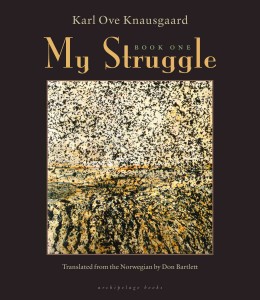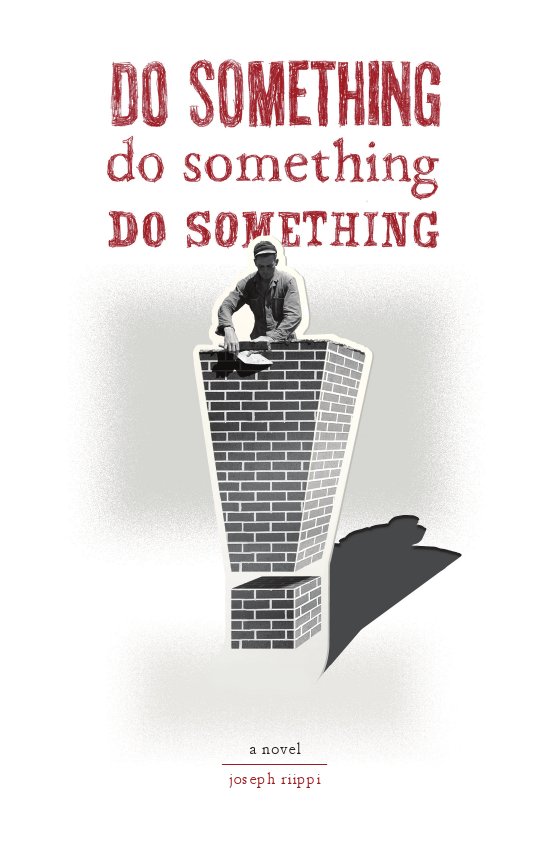Joseph Riippi’s SUMMER READS
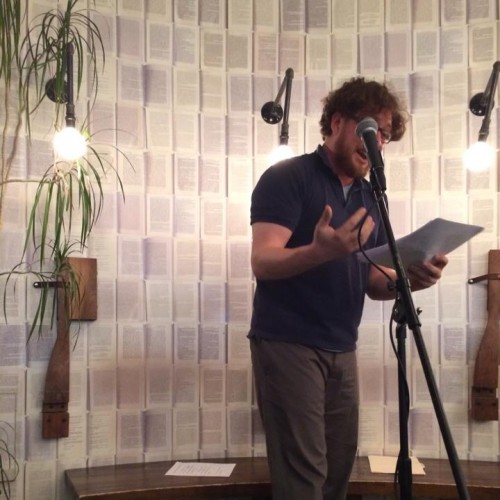
5 books Joseph Riippi is looking forward to this summer as part of this year’s Summer Reads.
***
My Struggle, Volumes I – III by Karl Ove Knausgaard
The series had me at its opening line: “For the heart, life is simple: it beats as long as it can.” I picked up the first two volumes at AWP in Seattle but only just started in and I’m loving the slow-burn reveal of this life. Volume III drops right around Memorial Day, so am hoping to being caught up by then, and then keep going.
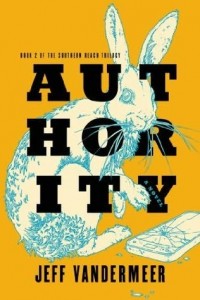
Authority by Jeff Vandermeer
I read a lot of books on buses this spring thanks to a book tour, and Vandermeer’s Annihilation—the first installment in his Southern Reach Trilogy—was one of my favorites. Its length was perfect for the ride to DC, and I just couldn’t put it down, a kind of understated post-apocalyptic thriller that was more about the characters than the post-apocalyptic landscape. Very excited for Authority, the second volume.

Scout Books Chapbooks by Chelsea Hodson, May-lan Tan, and Jay Ponteri
This is actually three books, but they’re chappys and they come out at the same time from the same place so let’s count them as one. Girly by May-lan Tan, Pity The Animal by Chelsea Hodson, and Darkmouth Strikes Again by Jay Ponteri are the next round of Scout Books from Kevin Sampsell’s Future Tense press, and are sure to be beautiful pocket-fitting objects for the summertime, nice little fistfuls of lit to sip beneath trees or on benches or while sitting under sun and waiting for your second hefeweizen at a beer garden in the early afternoon. (I have very specific plans for these, obviously).

The Histories, by Herodotus (new translation by Tom Holland)
My wife and I are going to Southeast Asia for the month of June and I won’t have room for much in the way of multiple books, so I’ve decided to bring one big, beefy tome to which I can attach the sentiment of our adventure. Plus, I’ve wanted to get into The Histories ever since first reading about it in The English Patient. The Ondaatje nerd in me is incredibly excited about filling my own Herodotus with receipts and scraps and a great deal of marginalia.
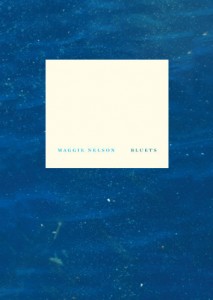
Bluets by Maggie Nelson
It’s just time.
***
Joseph Riippi’s most recent books are the novel Because and chapbook Puyallup, Washington (an interrogation), with illustrations by Edward Mullany. His next novel, Research: A Novel for Performance, is forthcoming this October from Civil Coping Mechanisms. Visit josephriippi.com.
May 19th, 2014 / 10:00 am
Because by Joseph Riippi
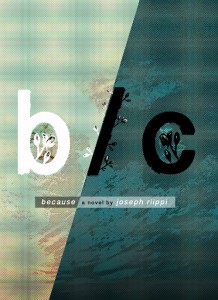 Because
Because
by Joseph Riippi
Civil Coping Mechanisms, February 2014
175 pages / $13.95 Book page at CCM / Buy from Amazon
It only takes about seven pages to begin to feel pained—even offended—by Joseph Riippi’s Because. This is primarily because every single sentence in the book (spoiler alert: except the last) begins with the words “I want.” A structure like this poses serious problems for a reader like me and like most of us, hyper-aware of the sins of heavy-handedness and bared authorial intention as we are. Because’s offenses against a readerly sensibility include:
1) Narcissism. It’s hard to like a book authored by someone who seems to speak only about himself.
Caveat: Riippi knows this. He says:
I want to feel less narcissistic for writing this.
I want to be honest in writing this, even if honesty means narcissistic feelings.
2) Melodrama/naïveté. The battle of the genuine vs. the ironic has been played out on many fields in the last few decades. I’m most acquainted with David Foster Wallace’s part in the battle for a post-postmodern literature that might be honest with the reader without being formally regressive. People mostly cite his “E Unibus Pluram” essay from A Supposedly Fun Thing I’ll Never Do Again when referring to this tension.[1]
Caveat: Riippi also knows this, and he is willing to own it.
I want you to know I mean this completely and sentimentally but unabashedly and honestly and without shame.
3) The economics. What right does a white American male with the wherewithal to write a book have wanting so many things? It would be easy to tee up Because as a “typically American” book, so focused on personal desires that it fails to consider the actual hardships of the external world.
Caveat: I’m pretty sure Riippi knows this too. Not quite as explicitly, but his desires are so robust, so myriad, that such an acknowledgment often seems implicit in them. In this section, for example:
I want better cellular reception. I want an espresso machine. I want espresso to be good for me. I want health to be delicious. I want all that is delicious to be good for me and all that is disgusting to be good for me…I want a self-filling refrigerator and self-cleaning pans and pots that never stain.
All of which is to say that Because feels to me as if it is kind of supposed to be painful to read. I came in knowing the “I want” premise of the book, expecting Because to be an experimental novel that would be a little difficult to get through. And it is that, but not in the way you think of experimental—distant from the reader, difficult in terms of breaking the code of its linguistic tricks. Instead, it is so open, bleeding, and honest that it is almost impossible to stand. This is its own kind of experimentation, I think, and an extremely valuable one—both in making us examine our readerly biases and in urging us, time after time, to transcend them by sticking with the narrator on a project, he admits, he is so unsure about.
All that said, there’s more to Because than just “its simple mantra-like structure,” as Kevin Sampsell’s blurb calls it. The book is split up into segments that are usually between one and four pages long, titled with the first line of each section. The “wants” often shift dramatically within a given section, from college-ruled paper to grandmother’s grocery lists to bioluminescent flowers, for example. But the book really begins to stride when Riippi stays on a subject for the entirety of a section, or longer. In one segment, he speaks of his friend Jenns; how as the only freshmen on the high school football team he and Jenns had their heads shaved by a guy named Gator; how Jenns took the fall after the team TP’d a cheerleader’s house; how Jenns shot himself, later, leaving an indelible mark on the narrator’s life. The narrative continuity of sections like this is striking in a work that usually shifts desires and subjects rapidly. The Jenns thread and a few others like it almost constitute a sort of home, reminding us, suddenly, how welcome such a narrowed focus can be.
But perhaps the most interesting strand that comes out of Because is a certain kind of “want” peppered across the book, especially in its later pages: the desire to live fully and dangerously in a world where our lives can often feel sanitized and certain.
I want to narrowly escape an explosion. I want to hear the sounds of falling bombs. I want to drop for cover and pray, to dig inside my helmet for a rosary or talisman, to hear over the cataclysm the prayers of all my brothers who surround me.
I want to tie tourniquets and grasp bloody hands. I want to learn the Last Rites by heart.
Passages like these feel odious at first, wildly privileged. They seem to make tragedy into a tourist attraction, commodify suffering instead of rejecting it as those who have experienced it would urge anyone to do. But upon encountering this sentiment again and again, the reader has no choice but to begin to understand it. Riippi’s speaker wants to live—and so might you, if you’re warm and safe somewhere now. It is only that Riippi is not afraid to say so.
This is a sensation that occurs more and more as you enter the book’s later pages: Riippi simply has no fear of how he will be perceived. Perhaps the most recurring image in Because is the narrator’s grandfather pounding a nail into a cedar tree with his bare hand. It is a fitting metaphor for the work Joseph Riippi has done with this book. It hurts, a lot, to read something so raw, composed with few tools besides human desire. But once you have finished—once the proverbial nail is in the tree—it is even more difficult to get it back out, to forget a book as open and rending as this.
***
[1] In another example from 1997, Wallace called David Markson’s Wittgenstein’s Mistress “a magical book, not because it alternates between incredible intellectual stunt-pilotry and pathos but because it manages to marry the two in a way that—I mean, that’s what my dream is, to someday be able to do something like that.” KCRW Bookworm interview, 1997. ~20:30.
January 24th, 2014 / 10:00 am
A Cloth House by Joseph Riippi
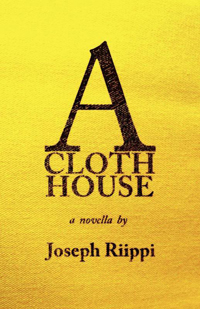 A Cloth House
A Cloth House
by Joseph Riippi
HOUSEFIRE, 2012
94 pages / $7.99 Buy from Amazon or Powells
Joseph Riipi’s novella, A Cloth House, reads like a transcript of a long-ago dream — fragmented, steeped in mist, sticky with synesthesiac description that cannot avoid its own hieroglyphic symbolism. A woman remembers her life to us with language that moves the same way our memories do, slipping between the concrete and abstract, alternating between inspection of the tiny objects we keep near to us and the larger fears and loves which we infuse into them.
What we’re presented with is a meditation on memory as told to the narrator’s sister who died too young. The guilt of her death, the deterioration of the mother’s psychiatric well-being, and the father’s stoic — if not somewhat cowardly — ambivalence. The story’s chronology is pleasantly muddy, which lends the work the ability to do what it is meant to do: to function less like a timeline, and more like actual memories — popping up when you least expect them, washing all of the facts over in time-stamped emotion.
“I know that in hitting me she had been hitting herself, taking the blame and painting the rest of us with it, which is why I can’t believe that badness was ever really real.”
The eponymous cloth: a safety blanket, the walls of a princess’ castle, one of the novella’s many mantras. The island: where her family lives, and perhaps more than that, how they live. While the latter serves as physical boundary, the former serves as another boundary within that boundary.
Something that great language-driven fiction does is to leave the impression within the passage of what is not said, and to point at that impression with both fingers. To point to the empty bed and allow the reader to infer its importance. Also, to speak conditionally of what could/should/would have been:
“He might have explained that love was the one part of a person’s life they could not in some way control, or change, or make believe differently.”
So much of what we are told is what was left unspoken, undone, unfelt. The lives not lived, the fairytale fantasies unfulfilled. The narrator explores the intimacy of suffering and how, in a soft, oceanside light, perfectly beautiful that suffering can be.
February 18th, 2013 / 12:00 pm
The Orange Suitcase
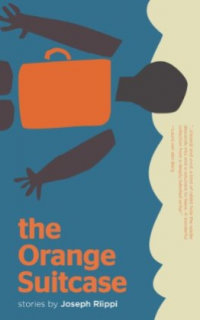 The Orange Suitcase
The Orange Suitcase
by Joseph Riippi
Ampersand Books, 2011
92 pages / $14.95 Buy from Ampersand Books
Rating: 7.0
Memories prop us up like skeletons. Each one exists autonomously, with its own root and biology, but put them together and you’ve got an emotional skeleton, something that helps shape who we are and the way we interact with the world around us. Over the course of the 34 short stories that fill The Orange Suitcase, author Joseph Riippi shines an x-ray on himself and examines a series of bone-like memories that are brief reflections on the formative experiences that make up his own skeleton.
October 11th, 2011 / 12:00 pm
Doing an Interview with Joseph Riippi
I couldn’t stop reading Joseph Riippi’s oddly-named novel, Do Something! Do Something! Do Something! (Ampersand Books 2009).The story concerns three people: an institutionalized guy named Eddie who is an extremely literate critic with a torn up life and questionable sanity; his sister, or step-sister, S., who was raped and subsequently spent some time in an institution herself; and an up-and-coming playwright named Martin, who is in the process of separating with his wife after the death of their 17-day-old baby. Damn.
It sounds oppressive, but somehow, it’s not. The features that carry the book are the vignettes Riippi embeds into their stories, and even though even these are not funny, they are wowing. S. (who is my favorite character) goes to a rock show and gets harassed by a dreadlocked motherfucker and later ties him by his hair to a park bench, then lights his dreads on fire. Eddie gets arrested for attacking a stripper with a broken glass, but he’s really just blacked out blitzed because his ex-girlfriend had security toss him from her art opening. Martin, wasted, nearly shits on a bum. Riippi draws their marrow with a syringe, and the pain he authors is so bad that none of the characters seem as despicable as I just described.
It’s a good book.
The following interview is kind of long, so let’s get to it.
How do you pronounce your last name? READ MORE >

